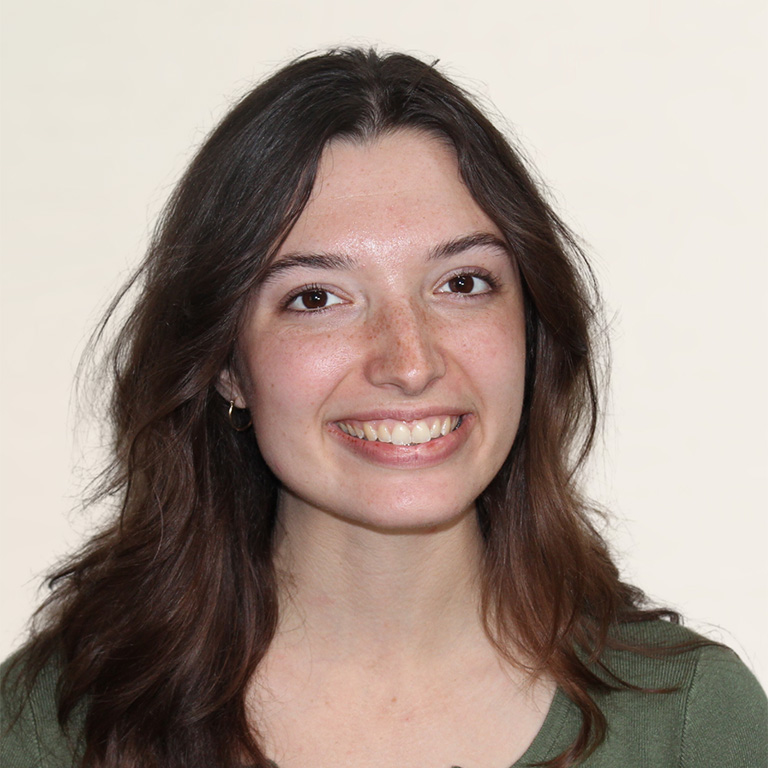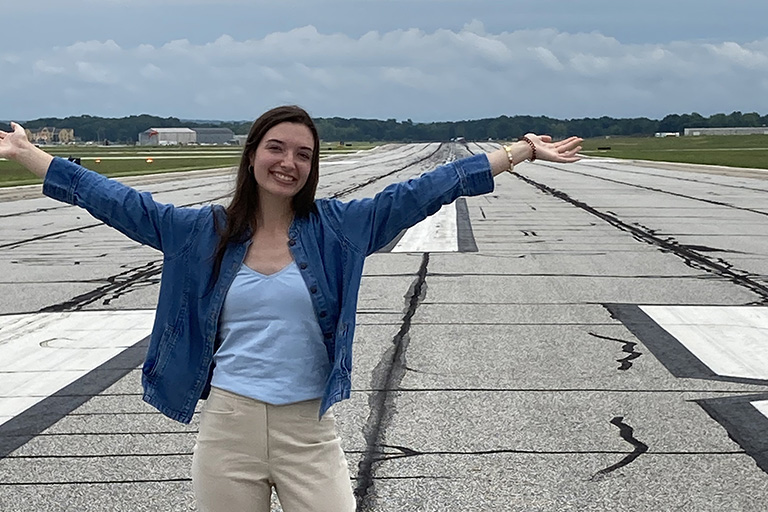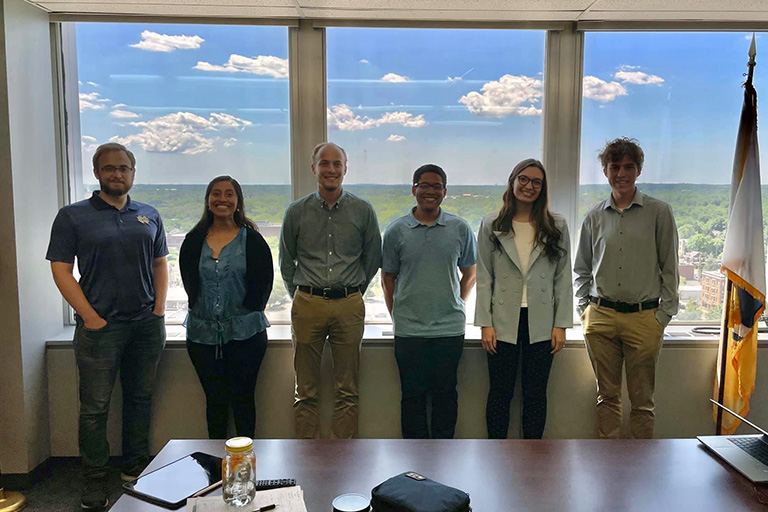This Q&A series highlights McKinney Climate Fellows alumni and their professional journeys within Indiana and beyond. The McKinney Climate Fellows program, administered by Indiana University’s Environmental Resilience Institute and Integrated Program in the Environment, connects IU undergraduate and graduate students interested in climate, sustainability, and community resilience with career experiences.
When Halee Griffey started college, she dreamed of working abroad to improve the lives of people in other countries. A virtual exchange program, however, convinced Griffey that she could have just as much of an impact by staying closer to home and creating a sustainable future for the Midwest.
In 2021, Griffey served as a McKinney Climate Fellow with the City of South Bend, helping the city update its greenhouse gas inventory and carbon disclosure project report. In January 2023, she became the City of West Lafayette’s first climate resiliency and sustainability officer, charged with leading the city toward the goals outlined in the recently adopted Greater Lafayette Climate Action Plan.
The following interview has been lightly edited for length and clarity.
What did you learn as a McKinney Climate Fellow?
Entering the McKinney Climate Fellows program, I knew that I was interested in sustainability. And prior to that, I knew from a very young age I was interested in the public sector. So what I learned most from McKinney Climate Fellows is how to combine both of those passions.
My time in the program was also where I found a huge passion for climate action, planning and implementation, and especially environmental justice. Thanks to the program, I got to move forward knowing that I can make real progress on a local scale.
What's your current position and what responsibilities does that job include?
My current position is the climate resiliency and sustainability officer for the City of West Lafayette. My main responsibilities are to implement the Greater Lafayette Climate Action Plan, with a focus on West Lafayette. I work with the Greater Lafayette Climate Action Plan joint leadership committee. I also act as a spokesperson for sustainability for the City of West Lafayette.
What do you like about your current job?
What I like about my job is that it is dual sided. There's a backend where I sit in my office and do research, but then there's also that frontend where I get to interact with community members. And I'm so thankful that in West Lafayette there are so many dedicated residents who are fighting for climate action. It not only makes my job easier, but it also makes me more motivated to take greater steps in climate action because I know there will be support.
What called you to pursue a career in sustainability?
Growing up, I hadn’t once heard the term sustainability, which is probably a common sentiment for many. When I was younger, my family wasn't too well off economically. We went thrifting a lot growing up; that's where we got most of our school clothes.
I was always so embarrassed of it growing up until I got to high school. In one of my English classes, I learned about fast fashion and how thrifting is good for the environment. It was almost like it was all piecing together. My family had taught me how to live sustainably, I just hadn’t known it.
I finally learned the word for it in my freshman year of college. I took it, I ran with it, and I was like, “This is my life's passion.” That's how I got started.
Why did you decide to stay in Indiana to pursue sustainability work?
My primary major as an undergraduate student was global and international studies from the IUPUI School of Liberal Arts. Initially, I really wanted to be a diplomat or work abroad with a non-profit or intergovernmental organization like the United Nations. I imagined myself working with low-income developing countries.
Then, I learned that not everyone wants a savior to come in from a developed country to tell them what to do. It wasn't until I did a virtual exchange program through the Honors College with students from the University of Rwanda that I learned that they were already doing so many incredible projects. There was so much I was learning from them, and it really humbled me in terms of my view on how we as Hoosiers or as people in the United States actually approach sustainable development across the world.
It made me think maybe we really do need help here. Not only because I have the personal connection of being in the communities that I grew up in, but also, we do need the help to avoid brain drain in Indiana. Trying to get as many people as possible in the climate community to stay in the Midwest is the best way we can transition to a more sustainable future.
What would be your advice to incoming fellows to get the most out of their time in the program?
Don’t limit yourself to a certain box or a certain interest. I think one of the most rewarding outcomes of being a fellow is that you get to test the waters on many different opportunities. Even if the sector you're placed in doesn't seem to align with your current career goals at first, take the opportunity to learn from that sector, and I guarantee your passions will grow and you'll find a way to connect your fellowship to your future.
What should students considering a sustainability career know about the industry?
One thing I always think is important is that sustainability isn't linear. It's interdisciplinary, it's multilateral. There's so much cooperation that happens. So, whether you're in the private sector or in the public sector or even in a non-profit, you can make your job and your passions align with sustainability goals that benefit the environment, social equity, and economy.
Along with that, sustainability isn't discriminatory. You don't have to be of a certain social status or live in a certain place. You don't have to go out and buy an electric vehicle. The most sustainable communities are low-income and Indigenous communities. We can learn a lot from looking at how to be more meaningful in our lives and to live within our means.
About the Environmental Resilience Institute
Indiana University’s Environmental Resilience Institute brings together a broad coalition of government, business, nonprofit, and community leaders to help Indiana and the Midwest better prepare for the challenges of environmental change. By integrating research, education, and community, ERI is working to create a more sustainable, equitable, and prosperous future. Learn more at eri.iu.edu.
About the Integrated Program in the Environment
Bringing together faculty, students and staff across 10 Indiana University schools, the Integrated Program in the Environment is a hub for academics, research, and activities focused on the environment. Administered by the O’Neill School of Public and Environmental Affairs, the School of Public Health, and College of Arts and Sciences, IPE is preparing the next generation of environmental and sustainability leaders. Learn more at environment.indiana.edu.





